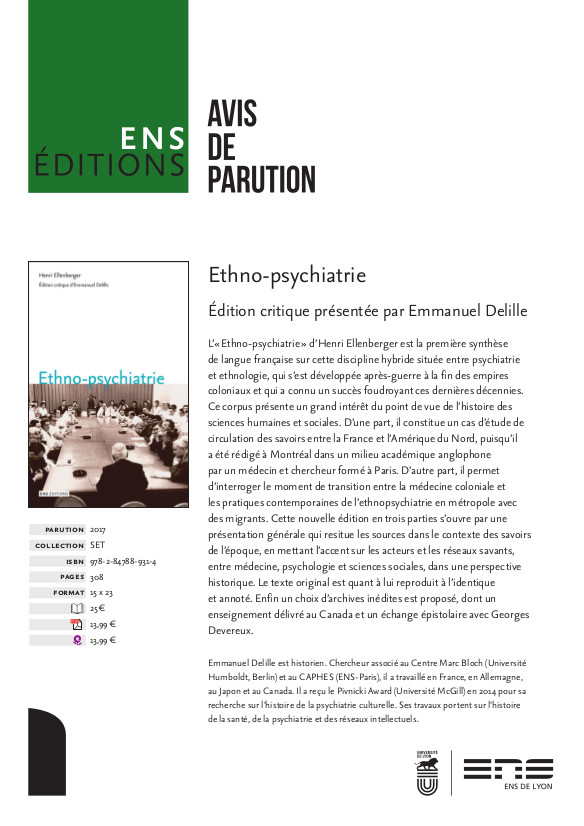Henri Ellenberger, Emmanuel Delille (éd.) Ethno-psychiatrie
L’« Ethno-psychiatrie » d’Henri Ellenberger est la première synthèse de langue française sur cette discipline hybride située entre psychiatrie et ethnologie, qui s’est développée après-guerre à la fin des empires coloniaux et qui a connu un succès foudroyant ces dernières décennies. Ce corpus présente un grand intérêt du point de vue de l’histoire des sciences humaines et sociales. D’une part, il constitue un cas d’étude de circulation des savoirs entre la France et l’Amérique du Nord, puisqu’il a été rédigé à Montréal dans un milieu académique anglophone par un médecin et chercheur formé à Paris. D’autre part, il permet d’interroger le moment de transition entre la médecine coloniale et les pratiques contemporaines de l’ethnopsychiatrie en métropole avec des migrants. Cette nouvelle édition en trois parties s’ouvre par une présentation générale qui resitue les sources dans le contexte des savoirs de l’époque, en mettant l’accent sur les acteurs et les réseaux savants, entre médecine, psychologie et sciences sociales, dans une perspective historique. Le texte original est quant à lui reproduit à l’identique et annoté. Enfin un choix d’archives inédites est proposé, dont un enseignement délivré au Canada et un échange épistolaire avec Georges Devereux.
Henri Ellenberger’s « Ethnopsychiatry » is the first synthesis in the French language on this hybrid discipline at the crossroads of psychiatry and ethnology, which developed in the post-war era with the end of colonial empires and which has met with tremendous success in recent decades. This body of work is of great interest within the history of humanities and social sciences. On the one hand, it represents a case study of the circulation of knowledge between France and North America as it was written in Montréal by a French-speaking researcher educated in Paris. On the other hand, it raises interesting questions about the transition between colonial medicine and the contemporary practices of ethnopsychiatry on the mainland with migrants. The new edition comes in three parts. The first offers a general presentation which puts the sources back into the context of the knowledge of this particular historical period, placing a strong emphasis on the actors and academic networks in medicine, psychology and social sciences. In the second part, the original text is reproduced and annotated. The third part offers a number of unpublished archives. This work is as much of a basic for researchers as for students and medical professionals.

